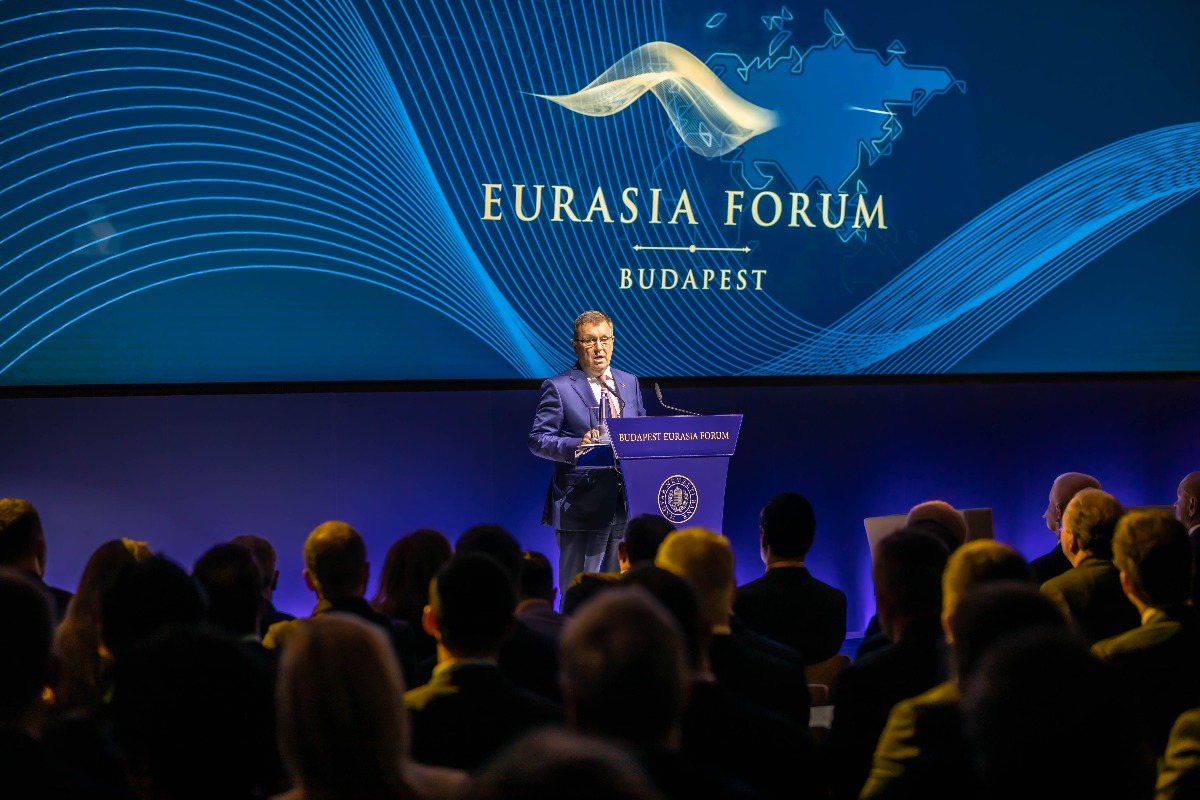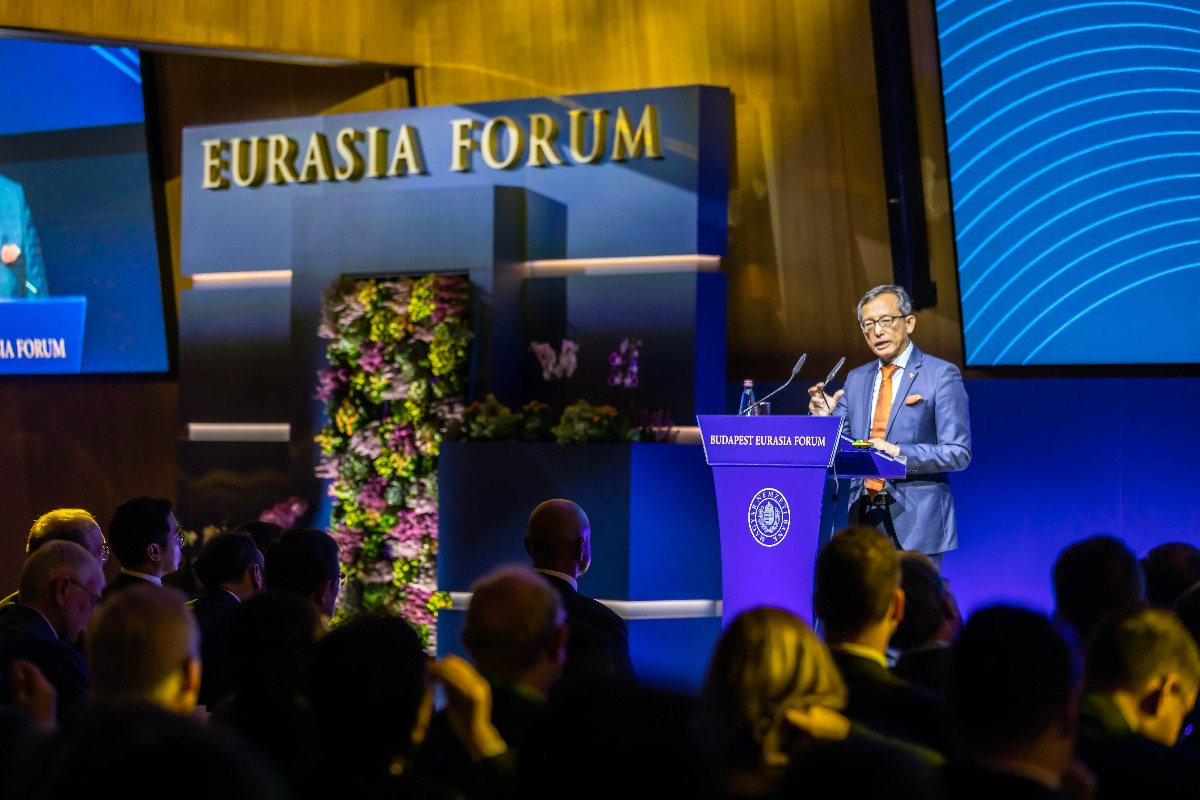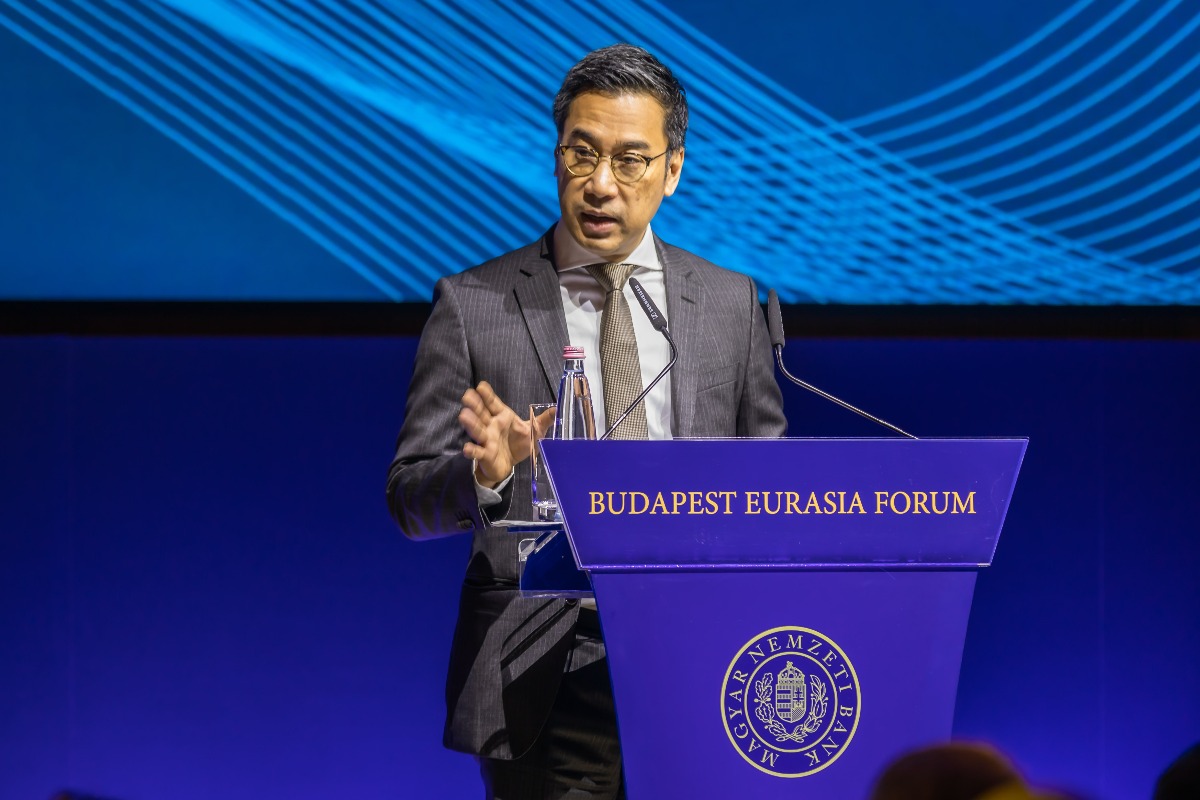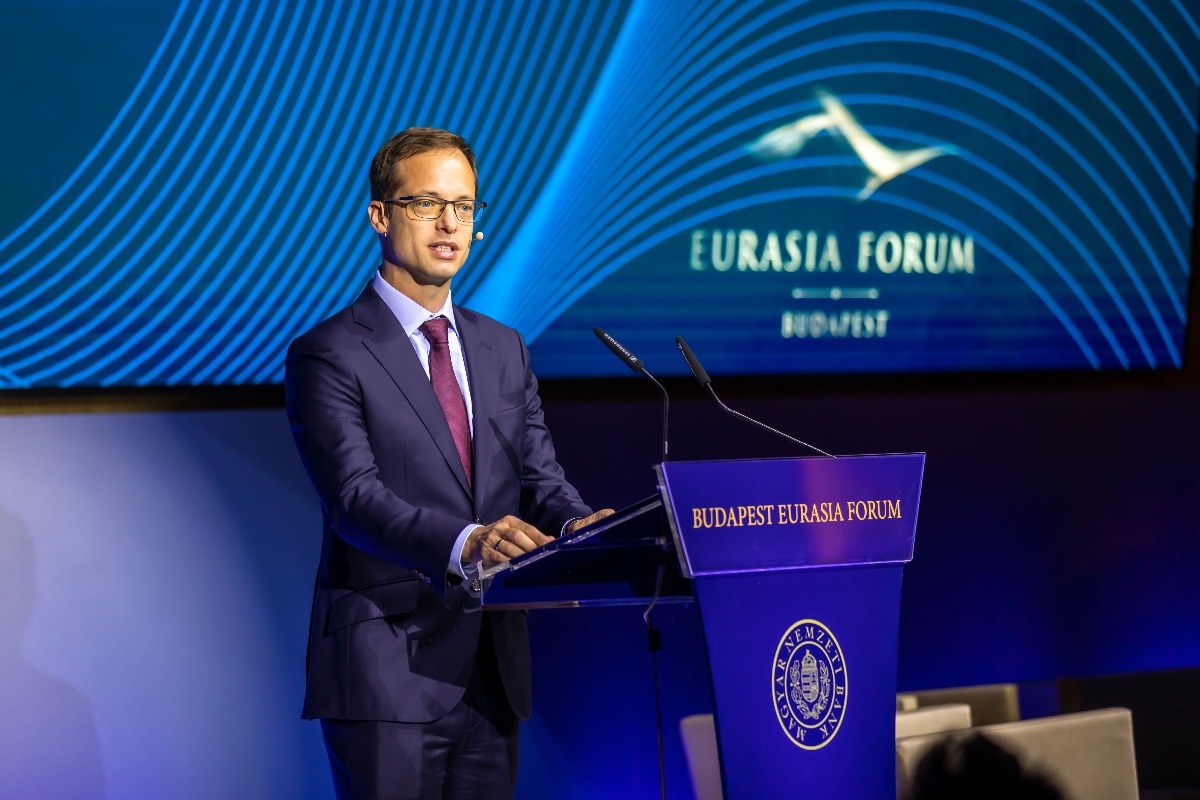
The Budapest Eurasia Forum was established with the aim of promoting dialogue between the countries of the supercontinent and finding common answers to emerging social and economic challenges while focusing on current mega‑trends including sustainability, digitalisation and technology, the modernisation of financial systems and the increasing importance of geopolitics. The annual event is centred around topics of finance, geopolitics, economy, infrastructure, multi‑lateral cooperation and education. The Forum also highlights the unique role and central position of Eastern Central Europe, and within it, Hungary and her capital Budapest.
Last year’s Forum took place 19‑20 September 2022 with the title “Sustainable Growth and Cooperation – How can we Win the 21st Century?” and the core message that increasing the intensity of multilateral cooperation will effectively address short and long‑term challenges alike. This year’s conference featured a line‑up of 48 speakers from 18 countries, most of whom attended the event in person.

The welcome speech was made by the Governor of Magyar Nemzeti Bank, György Matolcsy. Mr. Matolcsy observed that everyone has been looking for the secret recipe for sustainable growth and competitiveness, and stated that it lies in the process of achieving the desired result, in this case cooperation. This is where the importance of country‑to‑country talks and events such as this lies, the Governor added. He said learning from past economic lessons was crucial, and called for new patterns and rules to be established to facilitate adherence to the path of sustainable growth.
The Hungarian Minister of Culture and Innovation János Csák stressed that in order to achieve sustainable economic development it is important that more and stronger corporate players be involved so that the Hungarian economy can grow in the face of demographic issues.
Other speakers at the opening ceremony included Governor of the Bank of Thailand Sethaput Suthiwartnarueput, Chairwoman of Silk Road Fund Zhu Jun and Chairman of the Singapore Institute of International Affairs Simon Tay.

The panel entitled “Globalisation Vs. Regionalisation? The changing value chains, connectivity and prosperity of Eurasia” took a deeper look into the effects of the changing geopolitical scene and the CoVid‑19 pandemic on value chains, and analysed the role of megacities in these processes. In his video keynote speech, world-renowned expert on international relations and Dean of the Institute of International Relations of the Tsinghua University Yan Xuetong underlined the issues of counter‑globalisation and weakening regional cooperation, especially with regards to the Belt and Road Initiative.
The Geopolitics panel was moderated by Chairman of the Board of Trustees of the Pallas Athene Domus Meriti Fund (PADME) Norbert Csizmadia and included Chairman of Euro-Asia Forum in Politics, Economics and Business Mehmet H. Bilgin, Founder and Executive Director of Asian Trade Center Deborah Elms and Founder of Grisons Peak Services Henry T. Tillman with the online participation of Dean of the School of International Relations and Public Affairs at Fudan University Su Changhe.
The panel members agreed that Asia will, in the short term, remain the prime driving force of growth, and expect the increased prominence of new types of regional co‑operation initiatives with long‑term sustainability and connectivity in focus.

The fireside chat at the Infrastructure, Connectivity and Technology Panel titled “Logistics, infrastructure and technological developments in the service of a competitive and circular economy” was delivered by Nobel Prize awardee and Board Director of the Ban-Ki Moon Foundation for a Better Future Raekwon Chung. The chat and panel moderator was Head of the Centre for Technology Futures at the School of Economics, Mathias Corvinus Collegium Zoltán CSÉFALVAY In the 2000’s Raekwon Chung pioneered efforts to explore the economic potentials and opportunities offered by climate change mitigation. The panel discussion centred around a sustainability model which attaches an increasing importance to current and green markets merging along certain points to form one, common market rather than functioning alongside each other.
Moderated by Director of Magyar Nemzeti Bank Péter Fáykiss the discussion panel included Professor & Chair of the School of Civil & Environmental Engineering at Nanyang Technological University Jian Chu, President of Smart City Observatory Bruno Lanvin, Professor at the Graduate School of International Studies & College of International Studies of Korea University Seungho Lee and Executive Dean of Belt and Road School (BRS) of Beijing Normal University Biliang Hu, who participated in the discussion online. The panel shared the view that achieving a more sustainable economy has become increasingly pivotal.
Day 2 kicked off with an online fireside chat with Director of The Center for Sustainable Development at Columbia University Jeffrey Sachs, under the moderation of Deputy Governor of Magyar Nemzeti Bank Barnabás Virág. Sachs opined that the greatest issues of the world were presented by challenges, such as climate change, which involve the entirety of humanity. This should necessitate co‑operation between the United States and China as well as genuine multi‑lateral co‑operation efforts between major regions.
Titled “Success in uncharted waters: How can businesses gain ground in 21st-century Eurasian markets?” the Economy panel opened with an online fireside chat between Executive Director of Magyar Nemzeti Bank and panel moderator Gergely Baksay with Deputy Executive Director of the Hong Kong Trade Development Council Patrick Lau on the topic of the place of China and Hong Kong in the global economy. Moderated by CEO of The European House Ambrosetti Luca Miraglia. the panel discussion included Executive Director of Magyar Nemzeti Bank Ádám Banai, Head of China Research at the Institute of International Finance Gene Ma, Director of the IMD World Competitiveness Center Arturo Bris and Founder & President of The Center for China and Globalization Huiyao Wang – the last two participants joined online.
The keynote speech of the Multilateral Cooperation panel “Regional and megaregional integrations: How can international cooperation serve competitiveness on the supercontinent?” was delivered by former Governor of the State Bank of Pakistan Shamshad Akhtar. He highlighted the fact that the mutual dependence of Europe and Asia has the potential to promote reform of the regional multi‑lateral system, global growth, stability and economic welfare on a regional level.
The panel discussion was moderated by Program Director of the International Institute for Applied Systems Analysis Elena Rovenskaya. The panel comprised President of Korea Foundation for Advanced Studies Byung-il Choi, Executive Director of EU-ASEAN Business Council in Singapore Chris Humphrey, Associate Professor at Practice in Economics of Fudan University Christoph Nedopil and, online, CEO of Credit Guarantee & Investment Facility Guiying Sun. The expert members stressed the importance of integrated international co‑operation efforts and a common search for solutions in tackling the global crises of our times.

No sustainable development of the Eurasian region is possible without the consolidation of educational, cultural and social relations. The Education panel “How can connections between people serve the economic development of Eurasia?” kicked off with a fireside chat between President of the National University of Singapore Eng Chye Tan and Secretary General of the Hungarian Rector’s Conference, Chief Advisor to the Governor of Magyar Nemzeti Bank and panel moderator Zoltán Dubéczi. Eng Chye Tan spoke about the support of academic mobility being a crucial factor in enabling universities to fulfil their roles in talent management, facilitating a deeper connectivity between the regions and cultures.
The panel discussion, which was moderated by Associate Professor of Pázmány Péter Catholic University Gergely Salát, included Deputy Director of the Global Partnerships Office at Fudan University Dan Li (online), Chairman of ASEM Education and Research Hub for Lifelong Learning and Professor of Higher Education at Seoul National University Jung Cheol Shin. The panel agreed that mobility, international innovation in education, bi- and multi‑lateral university co‑operations as well as exchange and grant programmes play crucial roles in the emergence of competitive, sustainable and knowledge‑based Eurasian economies.
Hugely successful and boasting an especially broad line‑up of international participants of professional and scientific experts, the conference concluded with the closing remarks of Deputy Governor of Magyar Nemzeti Bank Mihály Patai. In his speech Mr. Patai pointed out the special importance of kicking international co‑operation into higher gear in every field from finance through the economy all the way to education. The bond between the nations of Eurasia is rooted in a common cultural heritage which will be the bedrock of intensifying co‑operation in the future.
You can watch the events of the Budapest Eurasia Forum 2022 on the event website (https://mnb.hu/eurasia) and YouTube. Following the huge success of this year, the conference, once again organised by Magyar Nemzeti Bank, will return in 2023.
Marcell Horváth – the author is an Executive Director of Magyar Nemzeti Bank
Dávid Szabó – the author is a Head of Department at Magyar Nemzeti Bank
Eszter Boros – the author is an International Expert at Magyar Nemzeti Bank
Nóra Anna Sándor – the author is a Senior International and ESG Advisor at Magyar Nemzeti Bank
The editors would like to thank Fruzsina Halász, Zsófia Gulyás, Veronika Mikes, Ildikó Nagy, Luyi Pintér, Györgyi Puhl and Dániel Szakács for their assistance in obtaining the key messages of the conference.